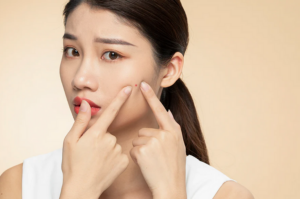Acne can be a persistent and frustrating skin condition, affecting people of various ages. While it may seem daunting, effective management and treatment can significantly improve the skin’s appearance. Here’s a comprehensive guide on how to get rid of acne and achieve a clearer complexion.

Understand Your Acne Type and Causes
Understanding the type of acne you have is fundamental to developing an effective treatment plan. Acne can manifest as whiteheads, blackheads, pimples, cysts, or nodules. Factors like hormones, diet, genetics, and skincare routines can contribute to its occurrence.
To embark on a journey toward clearer skin, one must first grasp the distinct types of acne that can manifest. Acne, a ubiquitous skin condition, exhibits itself in various forms such as whiteheads, blackheads, pesky pimples, deep-seated cysts, and stubborn nodules. Each manifestation arises from a unique interplay of factors, making a nuanced understanding of them pivotal for devising an effective treatment plan.
Maintain a Consistent Skincare Routine
Consistency is key when it comes to managing acne and achieving a clearer complexion. Establishing a structured and reliable skincare routine can significantly impact the overall health of your skin. To begin, choose a gentle cleanser as your initial step. This cleanser should effectively cleanse your skin, ridding it of impurities and excess oil, all without causing unnecessary dryness.
Next, it’s crucial to integrate specific acne-fighting ingredients into your routine. Substances like benzoyl peroxide, renowned for its antibacterial properties, can help combat the bacteria associated with acne. Salicylic acid, on the other hand, is excellent for unclogging pores and preventing new acne lesions. Additionally, alpha hydroxy acids (AHAs) can aid in gently exfoliating the skin, promoting cell turnover, and diminishing the appearance of acne scars.
After treating your skin with these targeted ingredients, it’s essential to follow up with a non-comedogenic moisturizer. Contrary to common belief, moisturizing is critical even for pimple-prone skin. Opt for a lightweight, non-greasy moisturizer that won’t clog your pores. This moisturizer will not only keep your skin adequately hydrated but also provide a protective barrier, ensuring your skin stays nourished without exacerbating acne.
Watch Your Diet and Hydration
A balanced diet and proper hydration can positively impact your skin. Reduce the intake of sugary, processed foods, and dairy, as they may trigger acne. Staying well-hydrated helps in flushing out toxins from your body, promoting clearer skin.
Regular Exfoliation
Incorporating regular exfoliation into your skincare routine is a game-changer when it comes to revealing a fresher complexion. This practice involves the removal of dead skin cells and the unclogging of pores, leaving your skin rejuvenated and vibrant. However, it’s crucial to choose a gentle exfoliator and limit its use to 2-3 times a week to prevent irritation.
Explore Professional Treatments
Consider seeking professional treatments from a dermatologist or skincare professional. They may recommend therapies like chemical peels, microdermabrasion, or laser treatments, tailored to your specific acne type and severity.
Manage Stress Levels
Stress can trigger pimple flare-ups by stimulating oil production in the skin. Adequate sleep and regular exercise also play crucial roles in managing stress levels.
Be Patient and Persistent
Achieving clear skin takes time and patience. Stick to your skincare routine diligently and give treatments time to show results. If you’re not seeing improvements, consult a dermatologist for personalized advice and treatment options.
In conclusion, combating acne requires a multifaceted approach involving proper skincare, a healthy lifestyle, and sometimes professional guidance. By understanding your acne, adopting a suitable routine, and maintaining patience, you can significantly improve your skin’s condition and regain your confidence.
